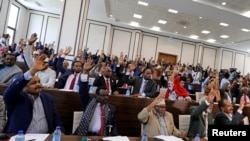Somalia has recalled its ambassador to Kenya and ordered Kenya’s envoy to leave Mogadishu over alleged interference in Somalia’s upcoming elections. Despite the spat, experts say there is a window for the countries to resolve their disagreements.
Somalia’s government accuses its neighbor Kenya of “continuous interference” in its internal affairs.
The accusations come a day after the Jubaland region leader Ahmed Mohamed, also known as Madobe, threatened to boycott the parliamentary vote scheduled for December.
Somalia’s Foreign Ministry permanent secretary Mohamed Ali Nur said Kenya had influenced Madobe’s decision.
“It has become clear for the Somali Federal government that the Kenyan government is openly interfering with the Somali affairs and pressuring the Jubaland president Ahmed Mohamed Islam to influence its interests and retract on the election model agreed on September 17th by the Somali government and regional leaders,” he said.
On Saturday, Madobe said extra security forces must be deployed to his area before he can go ahead with the election.
Kigen Morumbasi teaches International relations and security at the Strathmore University in Kenya. He believes Somalia and Kenya will get past this diplomatic dispute.
“We see now the upcoming elections in Somalia are already raising tension both domestically and across the border and when we look at the relations between states. There are cases where the state's interests sometimes clash with each other, and to deal with such a situation, diplomacy has to play its role. Now the fact that it has been called a consultation, that go back for consultation is a window of hope that diplomacy is still an option for the two countries,” he said.
In February 2019, Kenya also recalled its ambassador and sent a Somali envoy back home for consultations the auctioning of oil exploration blocks. After a few weeks, the situation went back to normal between the two countries.
Boaz Mbaya comments on foreign policy and diplomatic issues in East Africa. He said Somalia wants to be seen strong as it heads to elections.
“Somalia is beginning to look inward because there are elections coming up, and the authorities there would like to be seen as strong. So that’s probably an explanation of what can advance, but I don’t see the fallout leading to war between Kenya and Somalia,” said Mbaya.
In a press statement Monday, the Kenya ministry of foreign affairs said it has not received an official request that its envoy in Somalia to return home.
The statement further reads Kenya respects the sovereignty, political independence and territorial integrity of all countries.
Kenya and Somalia have an ongoing court case at the International Court of Justice over a maritime border dispute. Somalia has been reluctant to negotiate with Kenya about the disputed territory.
Mbaya said the two countries need to talk over the issues that are dividing them.
“Kenya and Somalia are members of IGAD, they are members of the AU, they are members of the United Nations. So we need a diplomatic solution to the problem, so there are no shortcuts and I think it’s a matter of engaging the right person at the right time and with the right atmosphere it should be possible,” he said.
Kenya is one of several African countries that has deployed troops in Somalia to fight militant group al-Shabab and support the Somali government, but its presence in the country makes many Somali officials uneasy.






